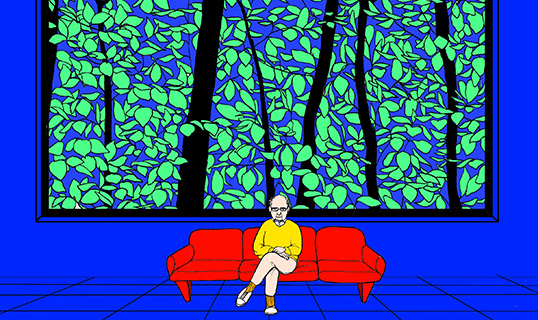Why was Kafka’s The Trial never completed? Critic Michael Masiello has suggested that the master chronicler of bureaucracy “struggle[d] to give any beginning-middle-end narrative shape to what is essentially dead and undistinguished time—time spent waiting, vainly seeking answers from different-yet-the-same sources, time lost in futility and longing and empty hope,” adding that Kafka himself probably did not realize how eerily what he conjured would “come to life in our modern bureaucratic hellscapes.” In the following story that takes place in The Trial’s parallel universe, Thai author Phu Kradat skillfully stages an encounter between Josef K. and “you” to reflect Thailand’s political reality in the twenty-first century—one that is similarly pierced with fear and paranoia. By introducing a very local motif—the dangerous tiger hornet—Phu Kradat, who published the story in 2018 in response to the ongoing abuse of judicial power under military rule in Thailand, makes the story fully his own.
Josef K. hobbled his way through the valley to the cement brick cabin where you reside one afternoon, about an hour before a tiger hornet flew right in and precisely ten years after you started residing in this cabin here.
The sunlight scattering in through the breeze block wall that afternoon had exerted itself to the point of fatigue. The lazy coos of the pigeons who shared your roof. The sharp smell of their droppings jabbing at your nostrils. Three geckos lying flat on the wall in serenity. Cobwebs wrapped around corners and breeze blocks just like fishnets expertly set down in the shallows. The cold blast barreling on relentlessly with none of its reputed wind chill effect. You were waking up with a pang of hunger and thirst. With sticky, bleary eyes you sat around in a stupor for a long while. A bitter taste in your mouth lingered from the painkillers you’d consumed before flopping down for a siesta right around noon.
A knock on the door made you get on your feet and shake off your sluggishness. Today was your day off. Same as yesterday and the days before. You had to take a break from your job cutting grass on the eucalyptus plantation after having come down with the flu. You’d remained bedridden for days on end, until today when the fever subsided somewhat. As the door opened, you were taken aback by one small-framed scrawny creature. Popping rib cage. Disheveled hair. Old clothes torn to rags. Strong body odor. A step back to recompose. A silent stare at the visitor’s face. When finally your ability to process returned, enough of it anyway, you asked, “Who are you?”
The gaunt, small-framed man moved his trembling lips and out came in broken syllables:
“Ka . . . My . . . name . . . is . . . Josef . . . Ka . . .”
You stared hard and motionless. Little by little, a story the landowner used to tell you over and over took shape in your mind’s eye. Now filled with certainty you said, “Oh my . . . Ka, it’s you. It’s really you, Josef Ka. You’re still alive?”
In that instant, K. threw himself in your arms. You embraced him in return, still without any explanation from him to clear your suspicion.
After a while, K. slid from the embrace and collapsed in a heap on your feet despite your concerted effort to keep him upright. It was all in vain: there wasn’t enough energy in your limbs. So you dropped to your knees and embraced K. once more.
“Look how skinny you are now. Skin and bones, Ka. I can hardly recognize you.”
Josef K. could only nod with difficulty.
You fetched water for yourself and K. Vitality restored and hunger gone into hiding, you examined every nook and cranny of the man all over again. K. sat with his eyes closed a wingspan away from you in the middle of the stifling room stuffed with a day’s worth of sun rays. The pigeons no longer cooed, though their droppings continued to saturate your nostrils, leaving no hint of K.’s body odor.
Unbelievable. How does a bank accountant with a promising future end up like this? You can’t tell this one apart from a mangy stray dog. READ MORE…


